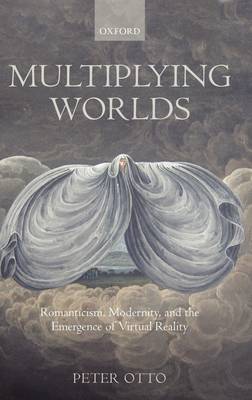
Je cadeautjes zeker op tijd in huis hebben voor de feestdagen? Kom langs in onze winkels en vind het perfecte geschenk!
- Afhalen na 1 uur in een winkel met voorraad
- Gratis thuislevering in België vanaf € 30
- Ruim aanbod met 7 miljoen producten
Je cadeautjes zeker op tijd in huis hebben voor de feestdagen? Kom langs in onze winkels en vind het perfecte geschenk!
- Afhalen na 1 uur in een winkel met voorraad
- Gratis thuislevering in België vanaf € 30
- Ruim aanbod met 7 miljoen producten
Zoeken
Multiplying Worlds
Romanticism, Modernity, and the Emergence of Virtual Reality
Peter Otto
Hardcover | Engels
€ 290,45
+ 580 punten
Omschrijving
Multiplying Worlds argues that modern forms of virtual reality first appear in the urban/commercial milieu of London in the late eighteenth- and early nineteenth-century (1780-1830). It develops a revisionary account of relations between romanticism and popular entertainments, 'high' and 'low' literature, and verbal and visual virtual realities during this period. The argument is divided into three parts. The first, 'From the Actual to the Virtual', focuses on developments during the period from 1780 to 1795, as represented by Robert Barker's Panorama, Jeremy Bentham's Panopticon, and James Graham's Temple of Health and Hymen. The second part, 'From Representation to Poiesis', extends the study of late eighteenth- and early nineteenth-century virtual realities to include textual media. It considers the relation between textual and visual virtual-realities, while also introducing the Palace of Pandemonium and Satan/Prometheus as key figures in late eighteenth-century explorations of the implications of virtual reality. There are chapters on Ann Radcliffe's The Mysteries of Udolpho, Beckford's Fonthill Abbey, the Phantasmagoria, and Romantic representations of Satan. The book's third part, 'Actuvirtuality and Virtuactuality', provides an introduction to the Romantics' remarkably diverse (and to this point rarely studied) engagements with the virtual. It focuses on attempts to describe or indirectly present the cultural, material, or psychological apparatuses that project the perceptual world; reflections on the epistemological, ethical and political paradoxes that arise in a world of actuvirtuality and virtuactuality; and experiments in the construction of virtual worlds that, like those of Shakespeare (according to Coleridge) are not bound by 'the iron compulsion of [everyday] space and time'.
Specificaties
Betrokkenen
- Auteur(s):
- Uitgeverij:
Inhoud
- Aantal bladzijden:
- 352
- Taal:
- Engels
Eigenschappen
- Productcode (EAN):
- 9780199567676
- Verschijningsdatum:
- 15/04/2011
- Uitvoering:
- Hardcover
- Formaat:
- Ongenaaid / garenloos gebonden
- Afmetingen:
- 157 mm x 236 mm
- Gewicht:
- 675 g

Alleen bij Standaard Boekhandel
+ 580 punten op je klantenkaart van Standaard Boekhandel
Beoordelingen
We publiceren alleen reviews die voldoen aan de voorwaarden voor reviews. Bekijk onze voorwaarden voor reviews.









